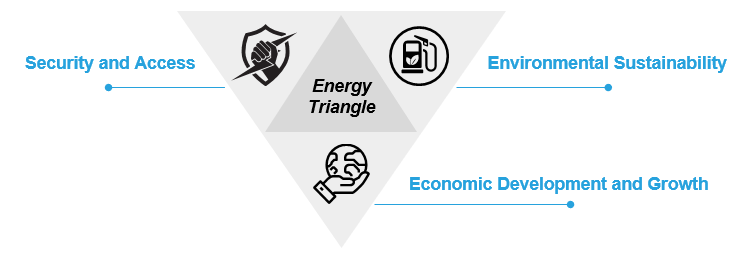What does a growing middle class in India have to do with new lubricant solutions for wind turbine gears in North America, or with Net Zero commitments and carbon taxes in various countries? A lot, and the lubricant and fuel industries, governments and end users play a role in all of it.
The interconnectedness of societal shifts, technology, government actions and more is illustrated in World Economic Forum’s (WEF) Energy Transition Index, launched in 2020. The index tracks the progress toward “a more inclusive, sustainable, affordable and secure energy system that provides solutions to global energy-related challenges.”
The Transition Index also declares that no single priority – price, availability, sustainability – can take precedence over others. The competing priorities are illustrated in what the WEF calls The Energy Triangle. The triangle’s three parts are: economic development and growth, environmental sustainability, and security and access.
It’s a big concept with big implications, but I think it’s worth spending some time looking at insights from the Energy Triangle as we map out the path ahead.

Economic Development and Growth
Energy demand grows as economies grow and develop, so WEF correctly identifies economic development and growth as an area that must be acknowledged as part of the balance of priorities. A rapidly growing middle class, especially in India and other parts of Asia, means a huge influx of new consumers who want access to household goods, vehicles and more.
ICE-powered vehicles will continue to be the dominant type of vehicle for the next few decades, but we know all vehicles will be expected to meet stricter efficiency requirements. Economic development and growth must be managed carefully but comes with opportunities, as we know we’ll need new ways to meet the added demand.
Security and Access
The energy transition simply can’t happen if appropriate infrastructure isn’t in place, which is why energy security and access is a non-negotiable segment of the Energy Triangle. Governments play a critical role in security and access, of course, mostly through incentives and regulations, but the lubricants and fuel industries also ensure security and access by building resilience into the supply chain.
Our industry also plays a role by providing innovative solutions to help OEMs and end users get the efficiency they need.
Environmental Sustainability
Governments, consumers, manufacturers and others are motivated to develop environmentally sustainable products and processes for a lot of reasons, but the reality is that more sources of energy are needed to meet demand. That’s why WEF identified environmental sustainability as one of the three priorities for an energy transition.
A century ago, the energy mix shifted as oil replaced other energy sources. We saw it again when nuclear energy became a viable alternative energy source. And we’re seeing it today in the transition to renewable energy, hydropower and other energy sources help meet demand.
The lubricants industry, again, plays an important role in this part of the energy transition by creating solutions for renewable applications. We are helping to improve mpg in ICE vehicles and developing solutions for BEV, hybrid vehicles and other evolving forms of transportation. We support the transition through solutions for wind turbines, thermal fluids in the solar industry, and more.
Our View
We need to create a positive and realistic vision for our industry and embrace the critical role we play in the Energy Transition. Continued partnership throughout the industry value chain – from refineries to additive supplies and oil marketers and OEMs on to distributors – is vital to our continued success.
By working together to advocate for a sensible energy transition, we can set a path toward greater energy security with energy sources that are friendlier to the environment while avoiding volatile costs. Working together, we can advocate for policies that promote long-term planning and minimize uncertainty, which will give us the confidence to develop new technologies.
Instead of reacting to changes seemingly forced upon us, let’s drive together as an industry and own our role in the energy transition.


.jpg?h=658&w=1170&la=en&hash=B18ACE38A4C352DFE970C5B4F2DA745C)





